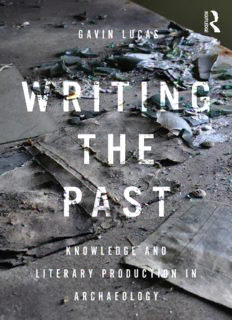
Writing the Past: Knowledge and Literary Production in Archaeology PDF
Preview Writing the Past: Knowledge and Literary Production in Archaeology
WRITING THE PAST How do archaeologists make knowledge? Debates in the latter half of the twentieth century revolved around broad, abstract philosophies and theories such as positivism and hermeneutics which have all but vanished today. By contrast, in recent years therehasbeenagreatdealofattentiongiventomoreconcrete,practice-basedstudy, such as fieldwork. But where one was too abstract, the other has become too descriptive and commonly evades issues of epistemic judgement. Writing the Past attempts to reintroduce a normative dimension to knowledge practices in archaeology, especially in relation to archaeological practice further down the ‘assembly line’ in the production of published texts, where archae- ological knowledge becomes most stabilized and is widely disseminated. By exploring the composition of texts in archaeology and the relation between their structural, performative characteristics and key epistemic virtues, this book aims to move debate in both knowledge and writing practices in a new direction. Although this book will be of particular interest to archaeologists, the argument offered has relevance for all academic disciplines concerned with how knowledge production and textual composition intertwine. Gavin Lucas is Professor of Archaeology at the University of Iceland, where he has been teaching since 2002. His main interests lie in archaeological method and theory as well as the archaeology of the modern world, with a special focus on the North Atlantic. This page intentionally left blank WRITING THE PAST Knowledge and Literary Production in Archaeology Gavin Lucas Firstpublished2019 byRoutledge 2ParkSquare,MiltonPark,Abingdon,OxonOX144RN andbyRoutledge 52VanderbiltAvenue,NewYork,NY10017 RoutledgeisanimprintoftheTaylor&FrancisGroup,aninformabusiness ©2019GavinLucas TherightofGavinLucastobeidentifiedasauthorofthisworkhasbeenasserted byhiminaccordancewithsections77and78oftheCopyright,Designsand PatentsAct1988. Allrightsreserved.Nopartofthisbookmaybereprintedorreproducedor utilisedinanyformorbyanyelectronic,mechanical,orothermeans,now knownorhereafterinvented,includingphotocopyingandrecording,orinany informationstorageorretrievalsystem,withoutpermissioninwritingfromthe publishers. Trademarknotice:Productorcorporatenamesmaybetrademarksorregistered trademarks,andareusedonlyforidentificationandexplanationwithoutintentto infringe. BritishLibraryCataloguing-in-PublicationData AcataloguerecordforthisbookisavailablefromtheBritishLibrary LibraryofCongressCataloging-in-PublicationData Names:Lucas,Gavin,1965-author. Title:Writingthepast:knowledgeandliterary productioninarchaeology/GavinLucas. Description:Abingdon,Oxon;NewYork,NY:Routledge,2019.| Includesbibliographicalreferencesandindex. Identifiers:LCCN2018035067|ISBN9780367001049(hardback:alk.paper)| ISBN9780367001056(pbk.:alk.paper)|ISBN9780429444487(ebk.)| ISBN9780429815218(epub)|ISBN9780429815225(webpdf)| ISBN9780429815201(mobi/kindle) Subjects:LCSH:Communicationinarchaeology.| Archaeology--Documentation.|Archaeologicalliterature.| Archaeology--Philosophy. Classification:LCCCC82.L832019|DDC930.1--dc23 LCrecordavailableathttps://lccn.loc.gov/2018035067 ISBN:978-0-367-00104-9(hbk) ISBN:978-0-367-00105-6(pbk) ISBN:978-0-429-44448-7(ebk) TypesetinBembo byTaylor&FrancisBooks For Elín, Marteinn, Benjamín and Elísabet June This page intentionally left blank CONTENTS List of illustrations ix Acknowledgements x 1 The production of archaeological knowledge 1 The literary archaeologist 1 Epistemology on the move 3 Knowledge and literary production 9 Doing the right thing: epistemic virtues in archaeology 12 2 Models of reasoning in Anglo-American archaeology 18 The legacy of the nineteenth century 18 Diverging traditions in the early twentieth century 23 Explanation and the philosophy of science 33 Interpretation and hermeneutics 42 Theory-ladenness, paradigm-dependence and relativism 51 Archaeological epistemology in the new millennium 57 3 Text types and archaeology 65 Introduction 65 Archaeology and narrative 66 Rethinking archaeological texts 73 Text types in archaeology 80 Text types and the digital humanities 88 viii Contents 4 Textual composition and knowledge production 97 Introduction 97 Narrative: a sense of an ending 102 Description: a sense of presence 111 Argument: a sense of reason 118 Exposition: a sense of order 125 Conclusion: detachment as an epistemic virtue 132 5 Mobile knowledge 136 Introduction 136 Paradigms and exemplars 140 Analogies and metaphors 143 Concepts and generalizations 150 Concluding remarks 157 Bibliography 160 Index 184 ILLUSTRATIONS Figure 5.1 A reproduction of one of the Folkton Drums next to a Melton Mowbray pork pie (photo: author) 147 Tables 3.1 Examples of different text typologies after author 77 3.2 Is this a shopping list, stock list or checklist? 78 3.3 Text dimensions with examples 80 3.4 Text types and their characteristics 81 3.5 The rhetorical structure of Binford’s “Willow Smoke and Dog Tails” (1980) as defined by its principal text types. 82 3.6 The rhetorical structure of Shepherd’s “Archaeology Dreaming” (2007) as defined by its principal text types. 83 4.1 Text types and their epistemic features 133 5.1 Strategies for mobilizing knowledge 158
Description: